Many users automatically type in search queries in Google, Bing or Yandex without much thought that these BigTech search engines collect virtually all information about them. Each time you ask Google a question, it collects your IP, search history, location data. Sum it up with the details Google retrieves from its other services, such as content of your gmails, what videos you watch and comment, what ads you click on, or what places you marked as visited on Google Maps, and here you go — the Tech Giant has made up your full profile, and it’s up to it what to do with these data.
However, since recently, ever more users worry about their privacy. Fueled by data misuse scandals, such as Facebook–Cambridge Analytica case, when misused details of Facebook users were employed to impact elections of the USA president, people prefer solutions that guarantee anonymity and security. And here, private search engines come to the front.
What is a Private Search Engine?
Private search engines are substitutes to Google and Bing that provide user privacy and don’t track user activities to collect their personal data and profile them.
Private search engines usually DON’T:
- track user data;
- record search history;
- support targeted ads;
- store IPs;
- sell user data to third-party companies.
Besides, their advantages include non-personalized search results and anonymous browsing. Most of them rely on proxy servers and save users from targeted advertisements.
Why Use a Private Search Engine?
Traditional search engines follow their users like cordon bleu detectives. In a while they will know everything about you: what queries you submit, what medications you bought recently, or that you were looking for a divorce lawyer not far from your place. This data collection process is called user profiling, and it’s intended to prompt you more staff similar to what you already searched for.
Private search engines don’t treat their users like marketing products. They respect your right to privacy and adhere to the idea that whatever you submit in search queries is nobody else’s business. So they don’t collect details about your IPs, search history, location and any other identifiable information — and it’s the primary reason to switch into alternative solutions.
Another reason worth is that private search engines return objective results based on their algorithms and not affected by your previous queries and the dossier about you. Thus, in terms of privacy at acts as a good anonymous proxy for search engine.
To draw a demarcation line between traditional and private search engines, just keep in mind: when you close the search engine, it gets over you in the most reasonable way. It hasn’t saved your credentials, IPs, cookies and search history, and therefore, it won’t use it to make profit.
Types of Private Search Engines
In terms of the method of retrieving responds to user queries, private search engines are divided into two classes.
Standard Private Search Engines
Such search engines rely on their own web crawlers that collect web-pages and build search indexes. In contrast to traditional search engines, they just don’t gather user personal data. This way, users are returned unbiased search results. However, such search engines can be inferior to mainstream competitors in terms of the volume of collected data.
Metasearch Engines
A metasearch engine transfers user queries to other search engines, gets responds from them, ranks them and returns this information to users. Private search engines function as intermediaries between users and mainstream search engines that usually provide the requested information, and anonymize user requests to enhance user privacy. This approach allows metasearch engines to extract more results than standard search engines can obtain, but they often show sponsored link ads and thus can influence the objectivity of your search results.
Top Private Search Engines
1. DuckDuckGo
DuckDuckGo is a famous project that advocates for confidentiality and privacy of online search. As they position themselves, they fight against the monopolistic ambitions of Google and other IT giants.
DuckDuckGo search features and advantages:
- High-quality search results not compromised by targeted ads;
- All features user might need, from news and videos up to weather forecasts and currency rate conversion;
- Privacy: the search engine doesn’t track its users and doesn’t store their search history;
- Exposing hidden trackers to prevent them from gathering your locations, search and browsing history;
- Email protection;
- App Tracking Protection that safeguards your Android apps from third party trackers.
DuckDuckGo retrieves search results objectively, without relying on your previous search history. Unlike traditional search engines that show you results distorted by the so-called “search filter bubble”, DuckDuckGo wisely ranks websites to show you results based on programmatic algorithms.
2. Startpage
Startpage is another privacy-oriented search engine project with a bunch of interesting features:
- Startpage servers removing user’s IP;
- price trackers blocking;
- preventing retarget of ads;
- support of Anonymous view;
- delivering unprofiled search results;
- zero-click answers that show responds to the queries right in the results page, without the need to open any website;
- settings allowing users to specify or hide their location
How Startpage works:
- The on-premises Startpage servers delete user’s personal data.
- Therefore, application servers don’t deal with user’s identifiable data. This is the second tier of servers that interact with providers of search results.
- Startpage returns unprofiled objective search results through their on-premises servers, with some contextualized ads.
- Anonymous View feature allows users to visit websites securely hiding their DNS, IP, location and user agent from the website they open.
- Startpage doesn’t store search queries in its logs or anywhere else. Thus, it doesn’t make up any user profiles.
- To prevent Startpage misuse for any illegal purposes, some especially suspicious requests are redirected to Stopitnow.org, an NGO that relies on stop signals delivered online to prevent certain kinds of crimes.
- Admins of school, library or company networks can update their DNS configuration imposing strict safe search in their network and setting Startpage as the default search engine.
As for Anonymous View feature, it delivers higher security levels than ordinary VPNs. Usually, privacy tools face the dilemma of handling Jav aScript: they either have to accept it, with the hazards it bears, or to disable JavaScript, which makes most websites look weird. Startpage uses advanced solutions to redefine JavaScript primitives and thus protect user privacy.
3. Brave Search
Brave search is a search engine that doesn’t track or profile its users and doesn’t censor the results it returns. Brave stands out of many other privacy-focused projects, as it retrieves search results from an independent Internet index, and not BigTech companies, such as Bing or Google.
In addition to privacy functionality that makes your search secure and confidential, Brave also offers a bunch of innovative user-friendly features.
Search Features
- Bangs are easy-to-use shortcuts that help go to the website a user prefers as the source of information. Brave offers hundreds of popular bangs, including those that help quickly open Wikipedia, Github, Reddit, social networks and so on.
- Goggles are a set of rules and filters that allow users to modify the ranking of search results. Basically, Goggles are a customized re-ranking of results returned by Brave index.
- AI-powered answers and descriptions are generated to offer users a helpful summary or brief of the information a user is looking for.
- Partner integrations with Tripadvisor, Kayak and Amazon improve user experience with related queries without violating Brave’s privacy guidelines.
- For $3/months, Brave offers Premium subscription for users, who prefer ad-free online search.
Privacy Features
- High privacy level. Brave doesn’t gather any personal information about users, their devices or search queries and doesn’t send online any identifiable details about its users.
- Anonymous local results for search queries such as “hospital near me” are based on detecting user IP, but without storing it or sharing it with other online systems. This approach prevents linking user search to their location.
- The right to be forgotten. Brave search results are retrieved from the index crawled independently of other search systems. That’s why Brave users may claim to delete their personal data from any webpage that published them.
- Anonymous and clearly marked ads that comply with Brave’s ethical guidelines.
In addition to highly secure search capabilities, Brave also offers its users such tools as the web browser and VPN.
4. Qwant
Qwant is a French search engine developed mostly for European users, who value privacy. In 2025, Qwant teamed with Ecosia to build their own privacy-first search index.
Privacy Features
- Qwant relies on its own indexing technology that ensures comprehensive search results without profiling its users.
- It doesn’t track any users or advertising and doesn’t store or sell users’ personal data.
- Qwant returns unbiased search results not tailored according to users’ profiles, as it doesn’t collect users’ personal data.
Besides, Qwant also offers a mobile app that functions as a web browser, which is available for Android and iOS.
5. Swisscows
Swisscows is a Swiss developer of the intelligent and safe search engine with the focus on privacy, moral values and online security of all family members. Swisscows attaches great importance to making the Internet a safe place for children, so their search engine won’t show any results related with pornography and violence.
Privacy Features
- Swisscows doesn’t create any user profiles and anonymizes all search queries.
- It cooperates with Brave while indexing website information.
- As Swisscows is not engaged in user profiling, it shows only objective search results not distorted by the impact of previous search history or user preferences.
- It collects only the minimum information required to render its services. For example, it doesn’t collect and store identifiable cookies.
- Swisscows works only via HTTPS connection.
- Anonymous preview window shows content of the web page in incognito mode.
Besides, Swiscows offer a bunch of privacy-focused products, including VPN, Edelcloud — a secure cloud storage for personal files, TeleGuard — a data-secure messenger, encrypted protected Swisscows.email and GetDigest — a tool designed to analyze and summarize online content and text docs. Most Swisscows products are paid, but in this case you exactly know the price, unlike with traditional search engineы, that collect “payment” from you with your personal and sometimes even confidential data.
6. MetaGer
MetaGer is an unusual search engine. Unlike many other privacy-focused solutions that build proprietary crawlers and create their own search indexes, MetaGer is a metasearch engine that relies on indexes of other search engines. At the time of the article, it is integrated with Bing, Mojeek, Brave and Serper. In addition to that, it retrieves images from Pixabay and news from OneNewspage.
MetaGer’s interesting features include Search in the Search function, a capability to create a personal blacklist and an option of ad-free search.
How MetaGer works:
- To start using MetaGer, a key is automatically generated for a user. Contact details are not required to create the key.
- Then a user has to pay for access to search results. The amount varies from 5 euros for the package of 500 tokens up to 60 euro for 6000 tokens. In MetaGer terms, a token is a “currency” charged for one ad-free search.
- After the payment, a user can access the search engine free of tracking and advertising.
- It is allowed to distribute your key on any number of your devices. Besides, you may share it with friends. To do that, just enter your key on another device.
- MetaGer doesn’t require user accounts, CAPTCHAs or logging. This search engine is designed in the way that it doesn’t produce any spam you’d have to combat with.
Besides, MetaGer offers an official extension for Google Chrome.
7. Mojeek
Mojeek is the 15-years-old project aimed to build an alternative independent search engine that doesn’t track its users and values their right to privacy. It’s a crawler-based search engine with its own index and, consequently, its own ranking algorithm. This allows Mojeek to retrieve unbiased search results not affected by user profiles or history search.
It currently supports only English, German and French languages.
- The underlying technology was developed from scratch based on C programming language;
- Mojeek doesn’t rely on any pre-existing web crawlers;
- Its servers run in Mojeek’s own managed infrastructure;
- Over 8 billion pages indexed;
- Supports safe search, semantic search and search summaries;
- Hosted in the most environmentally-friendly British datacenter;
- Mojeek doesn’t place any cookies on user devices;
- It doesn’t collect user IPs. In their logs, they replace it with 2-letter code to mark the user’s country.
8. Ecosia
Ecosia is a privacy-focused and environmentally-friendly search engine, so it might be a proper fit for the users, who want to go green. They spend a decent portion of their profit in planting trees all over the world and have already passed the mark of 200 million trees in 35+ countries. Besides the search engine, they also offer a web browser.
Ecosia privacy features:
- Ecosia allows users to customize the degree of personalization;
- Ecosia employs securely encrypted connection for search queries;
- It collects the bare minimum of data required to return search results;
- It doesn’t store user data and doesn’t create user profiles;
- Since it’s based in EU, Ecosia complies with the strictest privacy laws;
- Ecosia does collect user IPs to build protection against spam and bots, but it anonymizes IPs after one week;
Still, users that see their privacy as top priority in their online surfing should keep in mind that Ecosia relies on Google and Bing to deliver search results to its users.
9. Gibiru
Gibiru is another privacy-oriented online search project. In its privacy policy, it declares the following principles and security features:
- It doesn’t install any cookies in user devices and doesn’t maintain search logs;
- It doesn’t store any identifiable user data or search history information, and therefore users are protected from their data being sold.
Still, Gibiru makes users solely responsible for all risks they can face online, including any malware a user can accidentally accept on their device. To enhance user security, Gibiru recommends to install their mobile app and VPN. But at the time of writing the article, they announced shutdown of the VPN project. We have also failed to install their mobile app for Android from Google Play.
Gibiru seems to be a fading project that lags behind many search engine alternatives.
10. Searx
SearX is a privacy-focused open-source metasearch engine available under the GNU Affero General Public License. The project was discontinued and archived in September 2023, but its repository still remains open and can be found on GitHub.
Privacy Features
- SearX doesn’t share user IPs or search history with search engines that provide search results;
- It blocks tracking the cookies and user profiling;
- It doesn’t allow keywords of user queries to appear in web server logs;
- Every output links directly to the website, and not its redirect link;
- SearX support searching through files, images, maps, music, news, science, social media, and videos.
You can run SearX private instances on your own device. At the same time, you can still find public, user-run, SearX instances.
How Do Private Search Engines Make Money?
Private search engines use pretty similar revenue generation models to those employed by mainstream solutions. These are:
- Affiliate links and online shopping links, when a user buys a product available via the link shown in the web page with search engine results;
- Advertisements, when search engines show ads related to your queries. They can be less typical of your filter bubble, and, quite probably, these will be ads arising out of your current online session, and not the entire search history;
- Paid premium versions for users. The advantage usually offered by search engines is no ads during web search.
Get 20% off the original price with our special coupon!
BCR20
Are Private Search Engines Really Private?
You can’t be 100% secure online, but private search engines definitely ensure higher privacy and confidentiality than mainstream ones. They collect much smaller scope of data about their users, don’t usually store user profiles and search history, and don’t sell their data for marketing purposes.When choosing the best search engine for you, it’s wise to examine their privacy policy, terms of use, and approach to cookie files, and then to read user reviews. This way, you’ll be able to choose the safest and most private search engine that knows how to keep your data on the down low.
Frequently Asked Questions
Please read our Documentation if you have questions that are not listed below.
-
Are there any disadvantages of private search?
Some users view the lack of personalization as a drawback that reduces search results accuracy.
-
Do private search engines utilize AI?
Yes, Brave Search already has this innovative feature.
-
What is a filter bubble?
This is the information frame, in which users find themselves because of personalization and profling. This approach doesn’t allow users to go beyond their habitual opinions and learn more about opposite points of view, and sometimes even increases exposure to fake news.
Top 5 posts
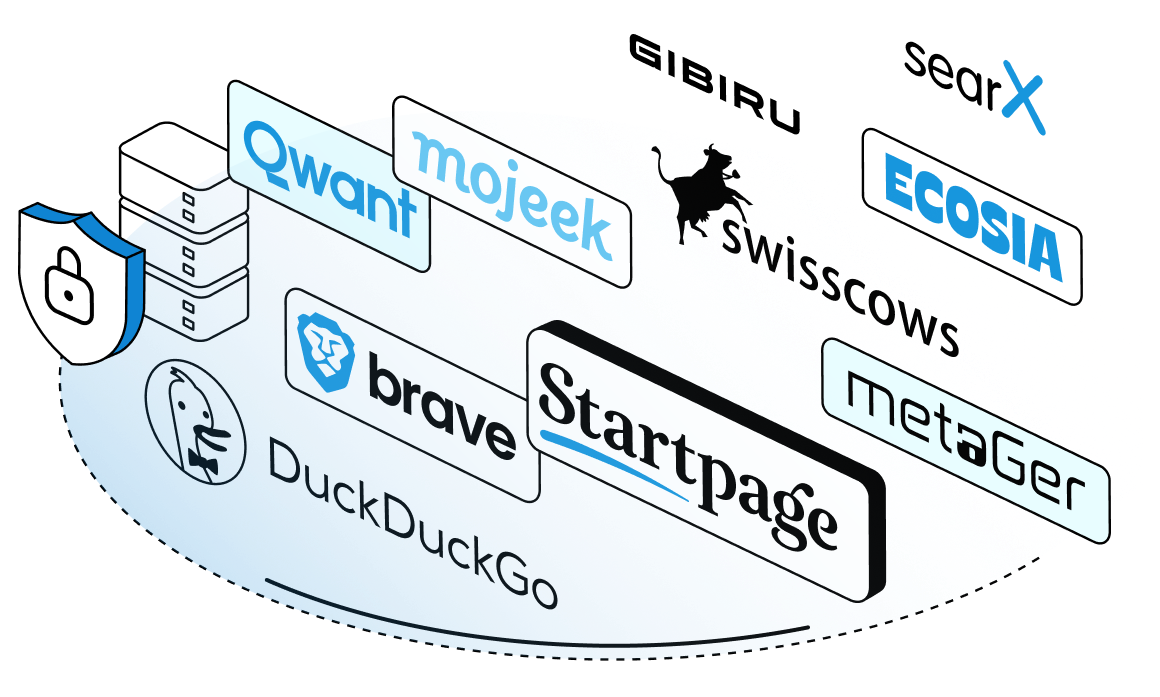

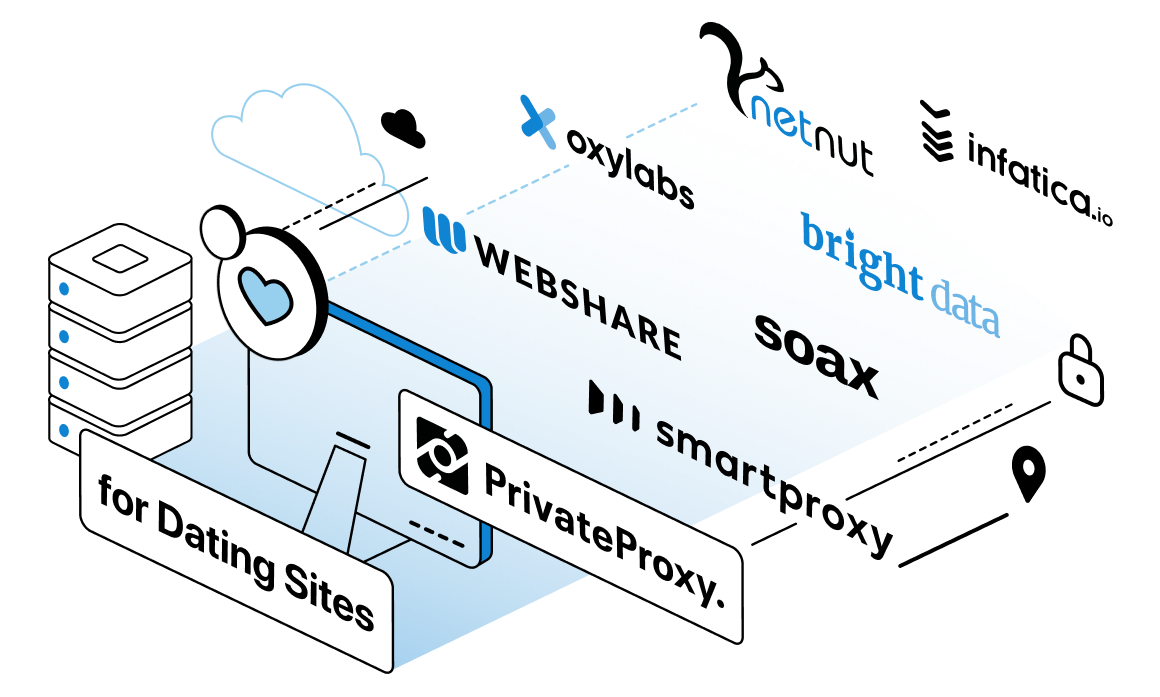

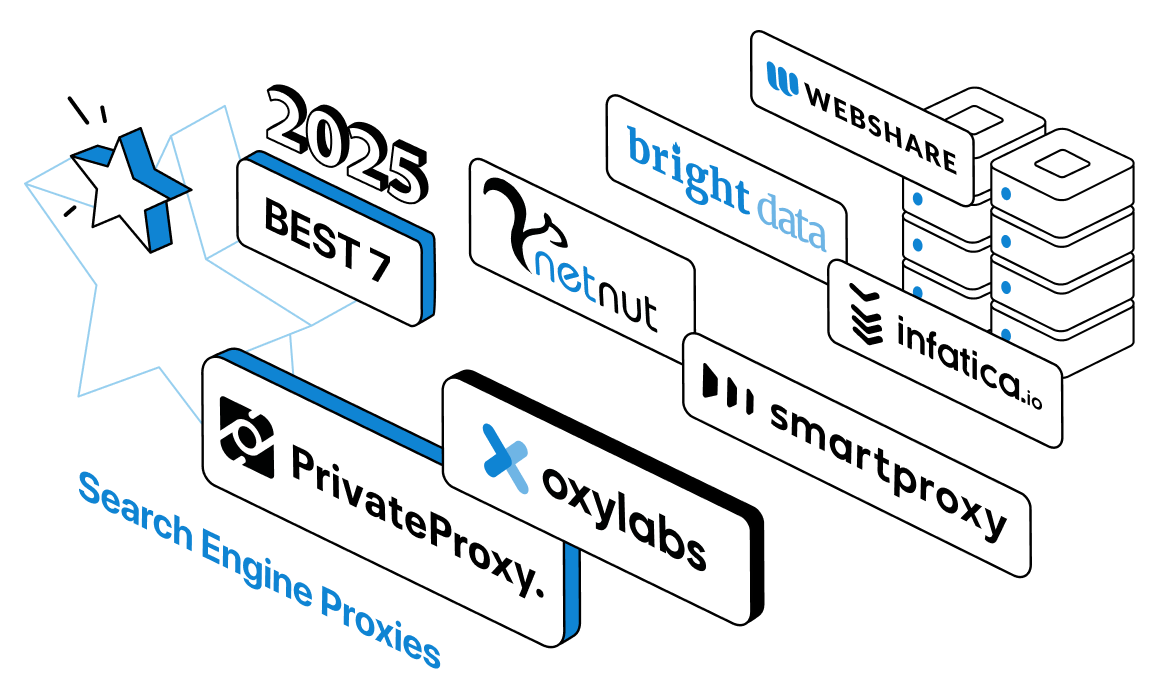

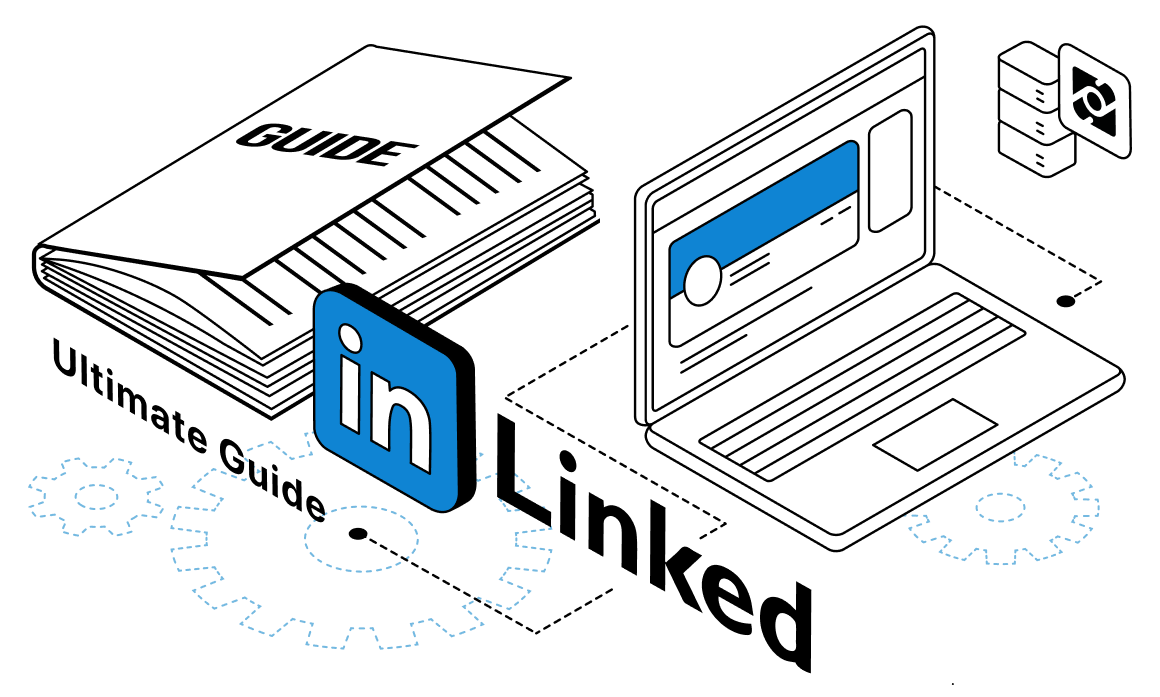
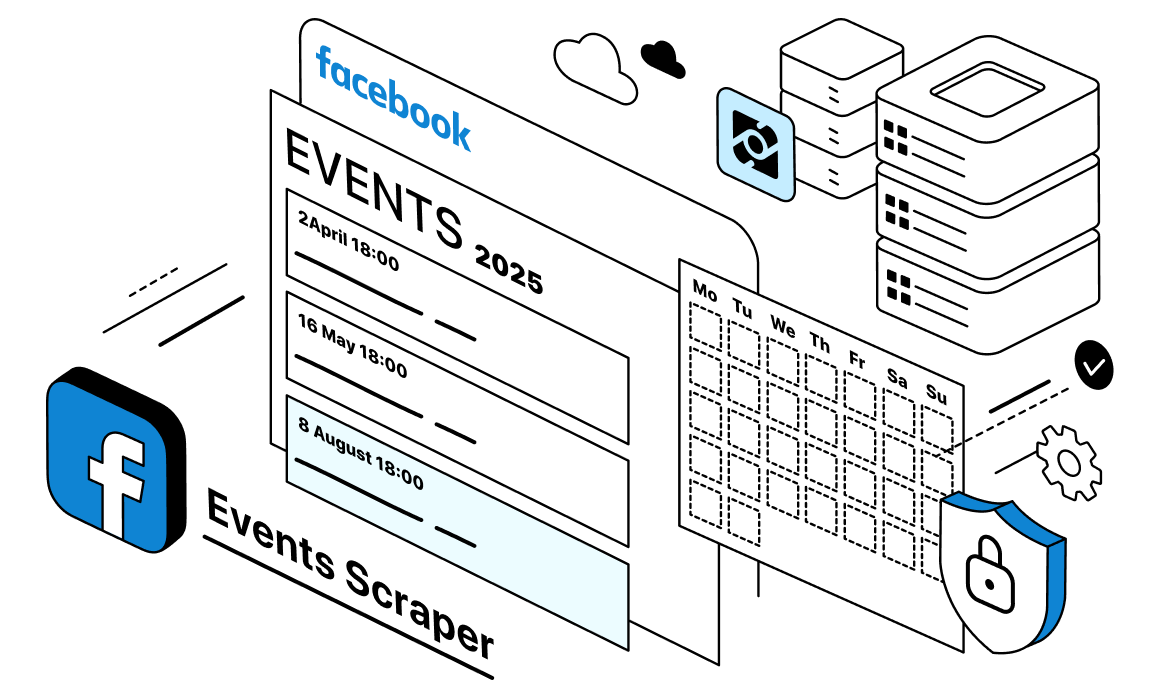

Online dating has become one of the main methods for modern people to find a date and match with people. Let’s see how proxies can help to use dating sites more effectively.